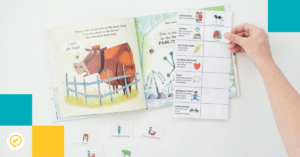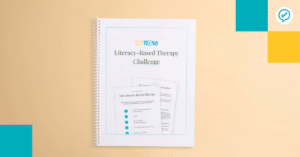I love sharing tips and tricks to help SLPs implement literacy-based therapy, but it’s not always easy to find the perfect reading resource for you mixed group! This series of blog posts will help you find fun, engaging articles that also make it easy to target your students’ goals. (I know I am always on the hunt for amazing reading resources to use in therapy!)
First up is…SYNTAX!
Where do we even start? There are so many syntactic structures that we could target in therapy (or maybe you have no idea where to even start!). The latter was definitely true for me! This article by Zipoli (2017) is incredibly helpful and identifies four types of sentence structures that may be particularly difficult for our students!
Passive Voice
Baking Bread Now and Then – This nonfiction passage about bread is written at a 3rd grade reading level. The author uses the passive voice while describing how bread used to be made (e.g., “The grain was ground by hand on a millstone.”)
A Club for Explorers – This nonfiction passage about the Explorers Club is written at a 7th grade reading level. The author uses the passive voice when describing their club’s adventures (e.g., “James Cameron was given an award for his trip…”).
Relative and Adverbial Clauses
Making the Team – This fiction passage is written at a 4th grade reading level. This is a story about Andreas and his friend, Tyrell, who try out for the basketball team and describe the experience. The author uses several relative clauses (e.g., “…who made the team tomorrow before school,” “…that he could see when Andreas was upset”).
Schools of Skate – This nonfiction passage about skateboarding is written at a 4th grade reading level. The author uses several adverbial clauses (e.g., “…because students had less time”).
Inspiring Olympic Athletes – This nonfiction passage about the 1980 Winter Olympics is written at a 3rd grade reading level. The author uses several relative and adverbial clauses (e.g., “After upsetting the Soviet team,” “who were cheering for them”).
Sentences with 3+ Clauses
The Farmer, the Snake, and the Eggs and Bacon – This fiction passage is written at a 4th grade reading level. The author uses several sentences with three clauses while he describes how a farmer makes breakfast.
Civil Rights on a City Bus – This nonfiction article about Rosa Parks is written at a 5th grade reading level. The author uses several sentences with 3+ clauses (e.g., “She also became a hero and an inspiration to people all over the nation who were fighting for racial equality, including Dr. Martin Luther King, Jr., a young minister who would soon become a major civil rights leader.”)
George Washington – This nonfiction article about George Washington is written at a 3rd to 4th grade reading level. The author uses several sentences with multiple clauses (e.g., “Before becoming President, Washington led the Continental Army to victory, winning American independence from Britain during the Revolutionary War.”)
Looking for more resources? Check out the SLP Now Membership! You can search for materials to help you teach these skills, as well as articles that include targets for all of your students’ goals. Try it today (for free)!




Marisha, thank you so much for sharing these links! I love literacy-based lessons to address speech-language goals. It is a powerful way to connect ideas and help our students store and recall information. There is a place for drills and repetition but when it comes to developing syntax and vocabulary, stories are the best. I have been intentionally working with my upper elementary students on sentence structure to train their thinking to be more flexible, to be able to manipulate units within a sentence and expand their comprehension skills. The resources that you shared in this post are just great to support their comprehension skills. Thank you, again!
Thank you so much, Mayra! I so appreciate your feedback!!